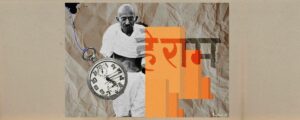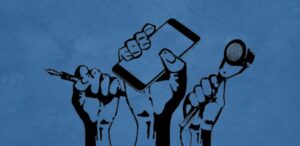Justice P.B. Sawant: Obituary; Article: How Much of a Democracy Is India, Really?
❈ ❈ ❈
Justice P.B. Sawant Is No More
Sabrangindia
On February 15, 91-year-old Justice PB Sawant breathed his last, leaving behind friends, family and a sea of people whose lives he had touched over the course of not just his career as a lawyer and a judge, but also post retirement.
Born on June 30, 1930, he obtained an LLB from Mumbai University and started practicing in the Bombay High Court, often representing labourers and farmers. He was inspired by Dr. BR Ambedkar and Jyotiba Phule, and strived to empower the most oppressed and marginalised sections. In fact, he was also president of the Mahatma Phule Samta Pratishthan for several years.
He went on to practice in the Supreme Court of India. He was appointed a Judge of the Bombay HC in 1973 and a justice of the Supreme Court in 1989. Justice Sawant retired in 1995, but that was only the beginning of his second innings as a man committed to justice and equality.
In 2002, Justice Sawant joined retired justice Hosbet Suresh on an Indian People’s Tribunal headed by Justice V. R. Krishna Iyer to investigate the 2002 Gujarat riots. Their report included the testimony of the now slain Gujarat BJP Minister Haren Pandya who said he had attended a meeting convened by then Gujarat Chief Minister Narendra Modi on the evening of the Godhra train burning incident, where Modi had directed all attendees to allow Hindus to vent their rage.
Justice Sawant also chaired a commission created in September 2003 to look into allegations of corruption against four Maharashtra ministers: Nawab Malik, Padmasinh Patil, Suresh Jain and Vijaykumar Gavit. He submitted his report in February 2005 indicting all but Gavit who was exonerated.
Justice Sawant also authored three books: Mass Media in Contemporary Society (1998), Advertising Law and Ethics (2002) and A Grammar of Democracy (2013).
A proponent of press freedom, he also served as chairman of the Press Council of India. But his commitment to free press did not mean he would allow channels airing defamatory content against him to go scot free. Justice Sawant sued Times Now for Rs 100 crores in September 2008 for wrongly using his image in a story, thereby defaming him.
On December 31, 2017, Justice Sawant, along with retired Bombay HC Judge BG Kolse-Patil, convened the Elgaar Parishad at the Shaniwar Wada in Pune. It is at this gathering that many activists made speeches against casteism. The activists, their associates as well as several others who were neither present, nor in any way connected with the Elegar Parishad event were later implicated in the Bhima Koregaon conspiracy, where the National Investigation Agency says that it was their fiery speeches that precipitated the violence at Bhima Koregaon the following day on January 1, 2018.
Both, Justice Sawant and Justice Kolse-Patil openly said that it was they who were the main organisers and sole funders of the Elgar Parishad. But a vindictive regime instead went on to target other activists.
“‘Elgaar’ means loud invitation or loud declaration, and our main theme was to save the Constitution and the nation,” Sawant had told CJP secretary and human rights defender in an interview in 2018. “The right-wing forces do not accept our present Constitution. They believe neither in democracy, nor socialism nor secularism,” he had said.
Sawant and Kolse-Patil had strategically selected December 31 as the day for the Parishad, because lakhs of Dalit citizens from across the country were set to gather at Bhima Koregaon near Pune the next day, to commemorate the 200th anniversary of an 1818 battle in which a British army with a continent of Mahars defeated the much stronger forces of the Peshwas, a regime noted for their casteist policies.
In fact, in September 2018, in an exclusive video interview to Teesta Setalvad, (Retd) Justice PB Sawant discussed why no action had been taken against Sambhaji Bhide in the Bhima Koregaon case. He also explained how the two sets of raids on activists and dissenting voices are a part of a wider RSS agenda to replace the Constitution with the Manusmriti and further their supremacist agenda.
Justice Sawant is survived by his wife, two daughters and a son.
❈ ❈ ❈
How Much of a Democracy Is India, Really?
Justice P.B. Sawant
Abraham Lincoln defined democratic government as a government of, for and by the people. This definition was true to the spirit of the origin of democracy in the ancient Greek city states, where all males above 18 years were participating in the day to day affairs of the government.
The essence of democracy is the participation of the people in the day to day affairs of the state. Mere elections are not democracy. The elections become necessary when on account of large populations people have to govern the state through their elected representatives. However, the sovereignty always vests in the people and they can exercise their powers directly inspite of their elected representatives.
For participation in governance, the citizen has to be equipped at least with basic human rights such as the right to live without fear or insecurity, right to employment and adequate standard of living, right to enough free education, right to free health services and right to clean and decent environment.
The present capitalist economic system cannot be expected to provide these basic human rights to every citizen. Under capitalism, it is the few entrepreneurs who use the national resources to run the industries and business, for their own profits and not for the benefit of the people.
What is more, the capitalist system necessarily concentrates the wealth in few hands. The history of capitalism shows that in no country so far, has there been full employment or social and economic equality. Nor does the system claim to provide every citizen with the basic human rights, including employment.
This means that not all citizens are in a position to effectively participate in the day to day governance of the country. At present only eight families owning giant multinationals possess half of the world’s wealth. In this country, only a handful of families own half of the resources of the country, with 85% of our population living below the poverty line. In other words, the vast majority of citizens cannot participate in the day to day governance of the country.
How can one therefore say that we have democracy in the country?
The primary task of any democratic government is, therefore, to provide the minimum basic human rights to every citizen. In other words, if democracy is to be real, the country must have a rational, planned and scientific economic order which will ensure first and foremost the empowerment of every citizen by providing them with basic human rights.
The next requisite for a democracy is to have social and economic equality and in any case, the least possible inequality. In capitalist economic order, we cannot expect such equality. The result is that in every “democracy” where there is capitalist economic system, there is no democracy at all. Instead, we have the oligarchy of the few.
The next and equally important requisite for democracy is to have non-discrimination between citizens on any ground, whether caste, race, region, religion, language or gender. Therefore secularism is implicit in a democracy. Those who don’t believe in equality and non-discrimination are therefore not democrats.
Since every citizen has to be provided with basic human rights, a democratic government is supposed to take initiative to do so. It is therefore, the function of a democratic government to undertake enterprises which will provide employment with a decent standard of living, shelter, education and health service to all.
Those who claim that the government has no business to do business, live in the 16th century.
A democratic government is not a government for maintaining only law and order and collecting revenue. That can be done by police and revenue officials. This does not require elected representatives.




